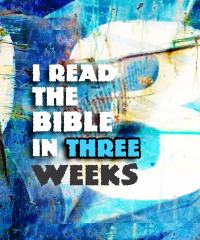I read the Bible in three weeks

For years, I carried a guilty secret. I’d devoted my life and career to the God of the Bible, and yet I had never actually read the entire thing. So I embarked on an adventure: I would read the whole Bible in just three weeks. I figured at least I would feel a little less like the hypocrite that I already am.
Tearing through the Bible at about fifty to a hundred pages per day has one clear benefit: you don’t get caught up in the details. I have been trained to inspect and dissect Bible passages in long, drawn out studies where two hours on four verses might be considered fast. I understand the benefit of this method, but sometimes I miss the forest for the trees. When you have one minute to read through Ephesians 1, you don’t have time to worry about how many times Paul says, “In Christ.” For me, this was a good thing.
So what did I learn? Two things. First, many of the characters of the Bible are more scandalous and scary than I remembered. Sure there are heroes like Joseph and Daniel who remain (apparently) untouched by the sin I struggle with. But for every Joseph there is a David or Solomon waiting in the wings.
Why is it that we like David so much? Sure, he wrote some nice poems that we’ve turned into worship songs; of course, it’s those same poems that talk about the union of babies’ heads and rocks. Sometimes the violence seems positively self-indulgent. When I read the stories of all but a few of the Kings of Israel and Judah, the question I ask is, “Why on earth would God want to save this lot?” Much of my Sunday School education consisted of moralizing the lives of people like David and Solomon. “What big giants does God want you to confront in your life?” “What sins do you need to repent of?” or “If you could ask God for one thing, what would you ask him for?” The Old Testament was reduced to a collection of simplistic morality tales, the reader approving or disapproving the actions of a given character and then appropriating the correct behavior.
If the Old Testament (and the New Testament for that matter) is not about “do or don’t do as these people,” what is it about? This brings me to my second discovery. One line that caught my attention over and over is God’s refrain, “I will be your God, you will be my people.”
When God establishes his covenant with Abram in Genesis 17, he says that he will be the God of “you and your descendants after you.” While in exile in Egypt, God tells Moses to say to the Israelites, “I will take you as my own people, and I will be your God.” Throughout Jeremiah and Ezekiel, as the Israelites deal once again with exile, the promise comes through the prophets, “I will be your God, you will be my people.”
This theme does not end with the Old Testament. 2 Corinthians and Hebrews remind us of this promise, and Revelation 21 gives us a majestic picture of what is to come: “Now the dwelling of God is with men, and he will live with them. They will be his people, and God himself will be with them and their God.”
Throughout my life it has never seemed that simple. I have been drawn to a complex and unattainable theology where the norm is a four-hour discussion over coffee about whether God’s love is an immutable attribute. I can appreciate the desire to know God through a systematic theology that protects our faith from infiltration; however, such an approach can take away the mystery and simplicity of our faith.
It was quite an adventure to read the Bible in three weeks. But today, if you asked me what the whole thing is about, I would reply simply, “It’s about God saying, ‘I will be your God, and you will be my people.’” All the stories in the Old and New Testaments build on this idea. Whether you consider the creation accounts, the punishment of David, the death and resurrection of Jesus or the movement of the gospel among the Gentiles, it’s all about God making a people for his own. That is good news.
—Nathan Clarke






